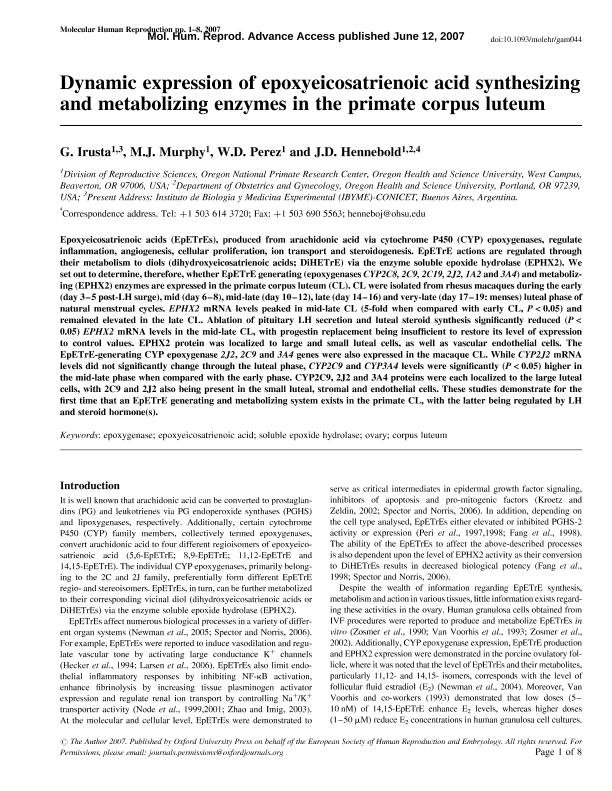Mostrar el registro sencillo del ítem
dc.contributor.author
Irusta, Griselda

dc.contributor.author
Murphy, M. J.
dc.contributor.author
Perez, W. D.
dc.contributor.author
Hennebold J.D.
dc.date.available
2017-10-10T15:26:52Z
dc.date.issued
2007
dc.identifier.citation
Irusta, Griselda; Murphy, M. J.; Perez, W. D.; Hennebold J.D.; Dynamic expression of epoxyeicosatrienoic acid synthesizing and metabolizing enzymes in the primate corpus luteum; Oxford University Press; Molecular Human Reproduction; 13; 8; 2007; 541-548
dc.identifier.issn
1360-9947
dc.identifier.uri
http://hdl.handle.net/11336/26334
dc.description.abstract
Epoxyeicosatrienoic acids (EpETrEs), produced from arachidonic acid via cytochrome P450 (CYP) epoxygenases, regulate inflammation, angiogenesis, cellular proliferation, ion transport and steroidogenesis. EpETrE actions are regulated through their metabolism to diols (dihydroxyeicosatrienoic acids; DiHETrE) via the enzyme soluble epoxide hydrolase (EPHX2). We set out to determine, therefore, whether EpETrE generating (epoxygenases CYP2C8, 2C9, 2C19, 2J2, 1A2 and 3A4) and metabolizing (EPHX2) enzymes are expressed in the primate corpus luteum (CL). CL were isolated from rhesus macaques during the early (day 3-5 post-LH surge), mid (day 6-8), mid-late (day 10-12), late (day 14-16) and very-late (day 17-19: menses) luteal phase of natural menstrual cycles. EPHX2 mRNA levels peaked in mid-late CL (5-fold when compared with early CL, P<0.05) and remained elevated in the late CL. Ablation of pituitary LH secretion and luteal steroid synthesis significantly reduced (P<0.05) EPHX2 mRNA levels in the mid-late CL, with progestin replacement being insufficient to restore its level of expression to control values. EPHX2 protein was localized to large and small luteal cells, as well as vascular endothelial cells. The EpETrE-generating CYP epoxygenase 2J2, 2C9 and 3A4 genes were also expressed in the macaque CL. While CYP2J2 mRNA levels did not significantly change through the luteal phase, CYP2C9 and CYP3A4 levels were significantly (P<0.05) higher in the mid-late phase when compared with the early phase. CYP2C9, 2J2 and 3A4 proteins were each localized to the large luteal cells, with 2C9 and 2J2 also being present in the small luteal, stromal and endothelial cells. These studies demonstrate for the first time that an EpETrE generating and metabolizing system exists in the primate CL, with the latter being regulated by LH and steroid hormone(s).
dc.format
application/pdf
dc.language.iso
eng
dc.publisher
Oxford University Press

dc.rights
info:eu-repo/semantics/openAccess
dc.rights.uri
https://creativecommons.org/licenses/by-nc-sa/2.5/ar/
dc.subject
Corpus Luteum
dc.subject
Cytochrome P-450 Enzime
dc.subject
Epoxide Hydroloses
dc.subject
Rna Messenger
dc.subject.classification
Bioquímica y Biología Molecular

dc.subject.classification
Medicina Básica

dc.subject.classification
CIENCIAS MÉDICAS Y DE LA SALUD

dc.title
Dynamic expression of epoxyeicosatrienoic acid synthesizing and metabolizing enzymes in the primate corpus luteum
dc.type
info:eu-repo/semantics/article
dc.type
info:ar-repo/semantics/artículo
dc.type
info:eu-repo/semantics/publishedVersion
dc.date.updated
2017-10-06T18:01:13Z
dc.identifier.eissn
1460-2407
dc.journal.volume
13
dc.journal.number
8
dc.journal.pagination
541-548
dc.journal.pais
Reino Unido

dc.journal.ciudad
Oxford
dc.description.fil
Fil: Irusta, Griselda. State University of Oregon; Estados Unidos. Consejo Nacional de Investigaciones Científicas y Técnicas. Instituto de Biología y Medicina Experimental. Fundación de Instituto de Biología y Medicina Experimental. Instituto de Biología y Medicina Experimental; Argentina
dc.description.fil
Fil: Murphy, M. J.. Oregon Health and Science University; Estados Unidos
dc.description.fil
Fil: Perez, W. D.. Oregon Health and Science University; Estados Unidos
dc.description.fil
Fil: Hennebold J.D.. Oregon Health and Science University; Estados Unidos
dc.journal.title
Molecular Human Reproduction

dc.relation.alternativeid
info:eu-repo/semantics/altIdentifier/url/https://academic.oup.com/molehr/article-lookup/doi/10.1093/molehr/gam044
dc.relation.alternativeid
info:eu-repo/semantics/altIdentifier/doi/http://dx.doi.org/10.1093/molehr/gam044
dc.relation.alternativeid
info:eu-repo/semantics/altIdentifier/pmid/17567599
Archivos asociados
